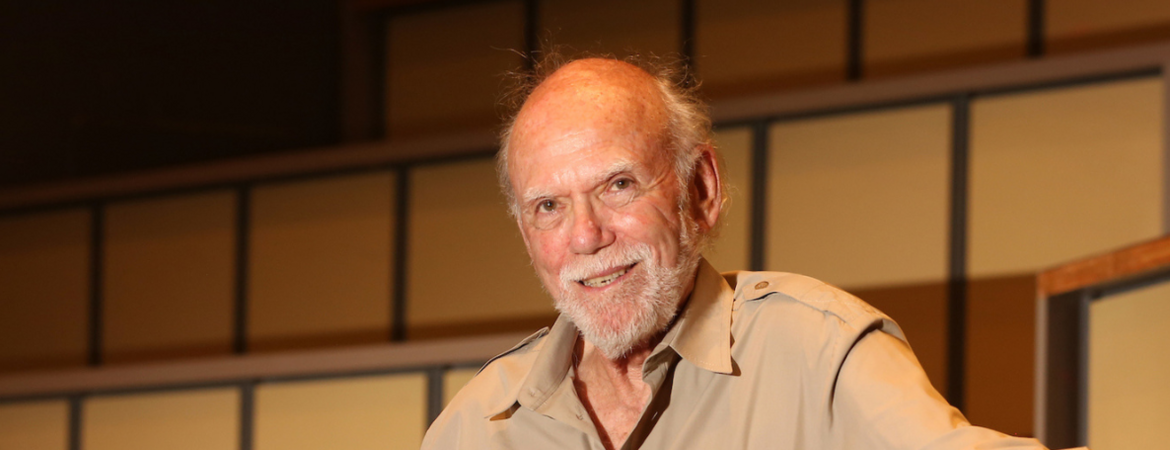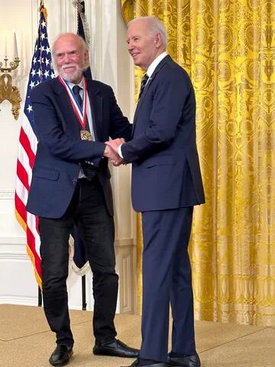
RIVERSIDE, CA - In a day-long series of campus events on Tuesday April 30, UCR will honor Barry Barish, Nobel Laureate, Distinguished Professor, and Endowed Term Chair for Teaching, Research and Service, on being awarded the 2023 National Medal of Sciences – the highest award given to American scientists – this past fall by President Joe Biden.
The medal is awarded to individuals in science and engineering who have made important contributions to the advancement of knowledge in one of six different fields. Professor Barish was awarded the medal in the category of physical sciences along with Myriam Sarachik, a Belgian-born American experimental physicist.
The first medal in the physical science category was awarded 60 years ago in 1963. The Committee on the National Medal of Science under the auspices of the National Science Foundation (NSF) is responsible for recommending medal candidates to the President.
The citation for Prof. Barish’s award reads:
“For exemplary service to science, including groundbreaking research on sub-atomic particles. His leadership of the Laster Interferometer Gravitational-Wave Observatory led to the first detection of gravitational waves from merging black holes, confirming a key part of Einstein’s Theory of Relativity. He has broadened our understanding of the universe and our Nation’s sense of wonder and discovery.”
Professor Barish was awarded the Nobel Prize in Physics in 2017 along with Rainer Weiss and Kip Thorne for decisive contributions to the LIGO detector and the observation of gravitational waves.
The on campus celebration for Professor Barish is entitled The Frontiers of Physics: A Celebration Honoring Barry Barish. The day begins with an invitation-only luncheon at 11:30 a.m. followed at 1:00 p.m. by the discourse: Presentations on the Frontiers of Physics, at the UCR University Theater. At that lecture, attendees will learn about research at the frontiers of physics being pursued by the Experimental Cosmology group that Professor Barish established at UCR. Keynote speakers will include Professor Art McDonald, winner of the 2015 Nobel Prize, and Professor Chang Kee Jung, winner of the APS 2022 Julius Edgar Lilienfeld Prize.
At 3:00 p.m. the schedule of events continues in the Physics Building with a tour of the research lab and the opportunity to meet faculty and students, followed by a reception in University Theater at 5:00 p.m. for the second installment of UCR’s Science Lecture Series (link). The reception will then give way to the honoree himself when Professor Barish gives a presentation on Gravitational Waves: Unraveling the Mysteries of our Universe.
In 1916, Albert Einstein conjectured that gravitational waves exist. They were discovered a century later by LIGO, the Laser Interferometer Gravitational-wave Observatory. Now, less than a decade after discovery, gravitational waves are becoming a powerful new tool to explore and understand our universe. Professor Barish and collaborators observed them coming from the collision of two black holes in the distant universe a century later, using their precision instrument called LIGO. The discoveries, some puzzles and future possibilities will all be explored by Professor Barish’s who will explain his work developing the LIGO detector (work for which he was awarded both the Nobel Prize and the National Medal of Sciences).
Professor Barish received his bachelor’s and doctorate in physics at the University of California, Berkeley in 1957 and 1962, respectively. He was a research fellow at Berkeley from 1962 to 1963 and then became a research fellow at Caltech. Professor Barish began is career in high-energy physics when he worked on experiments at the Stanford Linear Accelerator Center and Fermilab, where he was among the first to observe the weak neutral current, a linchpin of the electroweak unification theories of Glashow, Salam and Weinberg. In the 1980s he directed MACRO, an experiment that searched for exotic particles called magnetic monopoles and also studied penetrating cosmic rays, including neutrino measurements that provided important confirmatory evidence that neutrinos have mass and oscillate.
From 2005 to 2013, Professor Barish was director of the Global Design Effort of the International Linear Collider (ILC), a proposed 19-mile long linear particle accelerator. The ILC is the highest priority future project in the world for particle physics.
Professor Barish joined the UCR faculty in 2018 as Distinguished Professor. In addition to the Nobel Prize and National Medal of Sciences, he has received numerous other awards, including the Enrico Fermi Prize and election to the National Academy of Sciences and the Royal Society in London.
All events on April 30th are open to the public (except the luncheon), but registration is required.
